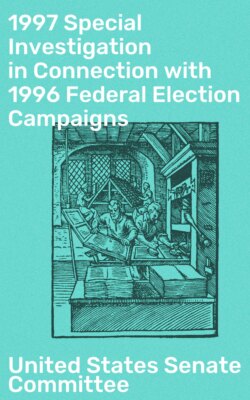Читать книгу 1997 Special Investigation in Connection with 1996 Federal Election Campaigns - United States Senate Committee - Страница 19
На сайте Литреса книга снята с продажи.
White House Coffees
ОглавлениеTable of Contents
Perhaps nothing illustrates this merchandising of the Presidency better than the DNC’s White House “coffees”—fundraising events at which major donors were provided access to the President in exchange for their campaign contributions.
Between January 11, 1995 and August 23, 1996, the White House hosted 103 coffees. Most lasted at least an hour, and the President attended the vast majority of them. Approximately 60 of these were DNC-sponsored coffees, 92 percent of the guests at which were major Democratic Party contributors. These guests made contributions during the 1996 election cycle of $26.4 million, an average contribution of over $54,000 per person, with one-third of their total donations, some $7.7 million, given within a month of the donor’s attendance at a White House coffee. For example, the five persons attending a coffee on May 1, 1996, in the Oval Office itself each contributed $100,000 to the DNC one week later.
White House and DNC officials have strenuously denied that the coffees were “fundraisers.” Numerous DNC documents, however, including detailed memoranda Ickes prepared for the President and Vice President, tell a different story, referring to these White House events as “political/fundraising coffees.” These documents carefully track the “projected revenue” that would be raised by each event—to the point of specifying amounts “in hand” (i.e., collected to date) and the proportion of each coffee’s projected revenue that would be placed in the party’s “hard money” and “soft money” bank accounts. While not every White House coffee was a fundraising event, most clearly were.
The coffees also demonstrate the extensive amount of time the President was willing to spend with small groups of major donors, and the extraordinary influence such donors had over the White House and the President’s schedule. The June 18, 1996 coffee organized by John Huang is a case in point. The only guests who were originally to attend this coffee were three foreign nationals from the CP Group, a Thai conglomerate. They were clients of Pauline Kanchanalak, a DNC fundraiser and lobbyist from Thailand. When DNC officials raised concerns about the propriety of such a coffee, “some people that might be potential [legal] donors, [i.e.,] American citizens,” were invited at the last moment. It is clear that the coffee’s essential purpose was to sell the President’s time to Kanchanalak—who, with her mother-in-law, donated $235,000 in to the DNC the next day—to make her look good in front of her clients.6 Even worse, the only guests professing to have any memory of the event recall Huang openly soliciting DNC contributions, in the presence of the President. This was clearly illegal.
